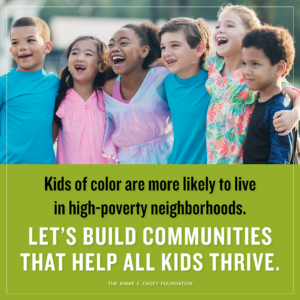Posted on October 4, 2019
What’s New?
We’re Hiring! Census 2020 Coalition Project Organizer
Posted on October 2, 2019

ACNJ is currently seeking an individual for the Census 2020 Coalition Project Organizer position. To see job details and to apply, please click here.
Join us for ACNJ’s 4th annual breakfast!
Posted on September 25, 2019
You're invited to our December 4th annual breakfast. It is with the help of our supporters and many partners that we are able to continue to deliver for New Jersey's children. As we take a look back at 2019, we are also especially excited to share with you about what's ahead at ACNJ.
Let's celebrate our wins for kids. Reserve your seat today!
Consider supporting our efforts as a sponsor. View sponsorship opportunities for this event.
Wednesday, December 4, 2019
8:30 a.m. - 10:00 a.m.
The Clubhouse at Galloping Hill
Kenilworth, NJ
Hope to see you on there!
NJ: One of 10 States in the US with Increased Number of Kids Living in Concentrated Poverty
Posted on September 24, 2019

New Data Snapshot with State-by-State Data from the Annie E. Casey Foundation Shows Garden State’s Youngest Residents More Likely to Live in High Poverty Areas
NEWARK, N.J. — Beyond being one of 10 states with increasing numbers of concentrated child poverty, new data show that 13 percent of New Jersey’s children under age 5 live in high-poverty neighborhoods, a greater percentage than other age groups and above the statewide average of 9 percent.
The KIDS COUNT® data snapshot “Children Living in High Poverty, Low-Opportunity Neighborhoods,” released today by the Annie E. Casey Foundation, examines where concentrated poverty has worsened across the country despite a long period of national economic expansion.
“Growing up in a community of concentrated poverty — that is, a neighborhood where 30 percent or more of the population is living in poverty — is one of the greatest risks to child development,” said Cecilia Zalkind, president and CEO of Advocates for Children of New Jersey (ACNJ). “This is particularly concerning for our youngest children. During their formative years, where a child lives, learns and plays will have a direct impact on their academic success, as well as their physical and emotional health.”
Alarmingly, more than 8.5 million children live in these settings nationally. That’s nearly 12 percent of all children in the United States. Children in high-poverty neighborhoods tend to lack access to healthy food and quality medical care, and they often face greater exposure to environmental hazards, such as poor air quality and toxins like lead. Financial hardships and fear of violence can cause chronic stress linked to diabetes, heart disease and stroke. And when these children grow up, they are more likely to have lower incomes than children who have relocated away from communities of concentrated poverty.
Using the latest data available from the U.S. Census Bureau, the data snapshot shows that poverty is becoming more concentrated in the Garden State. In 2000, 14 percent of low-income children — kids whose families earn below 200 percent of the federal poverty line — lived in an area with concentrated poverty. The most recent data indicate that 22 percent of low-income kids now live in these areas.
Conversely, 3 percent of moderate-income children live in areas of concentrated poverty. National and state data point to disparities for children of color, who are more likely to live in high-poverty neighborhoods, among other concerning trends.
Key national findings from the snapshot include:
- Overall, urban areas have both the largest number and the largest share of children living in concentrated poverty: 5.4 million or 23 percent of all kids in cities. About 11 percent of kids (1.2 million) in rural areas live in poor communities, while 5 percent of suburban kids (2 million) do.
- States in the South and West tend to have high rates of children living in concentrated poverty, making up 17 of 25 states with rates of 10 percent and above.
- African-American and American-Indian children are seven times more likely to live in poor neighborhoods than white children, and Latino children are nearly five times more likely, largely as a result of legacies of racial and ethnic oppression and present-day laws, practices and stereotypes that disproportionately affect people of color.
ACNJ joins the Casey Foundation in calling on national, state and local stakeholders to act now to help families lift themselves out of these circumstances. Policies at the community, county and state level can have a significant impact on the lives of children in struggling families.
“To ensure that New Jersey has a bright future, we need to look at our children and see how to best help them move forward,” said Zalkind. “This snapshot includes recommendations and best practices for policymakers, advocates and stakeholders to consider in order to join together and implement solutions to help New Jersey’s children grow up safe, healthy and strong.”
About Advocates for Children of New Jersey
Advocates for Children of New Jersey is the trusted, independent voice putting children’s needs first for
more than 40 years. Our work results in better laws and policies, more effective funding and stronger
services for children and families. For more information, visit www.acnj.org.
About the Annie E. Casey Foundation
The Annie E. Casey Foundation creates a brighter future for the nation’s children by developing solutions
to strengthen families, build paths to economic opportunity and transform struggling communities into
safer and healthier places to live, work and grow. For more information, visit www.aecf.org. KIDS
COUNT ® is a registered trademark of the Annie E. Casey Foundation.
###
What You Need to Know About NJ’s Strengthened Paid Family Leave
Posted on September 24, 2019

New Jersey's improved paid family leave passed in February 2019, showing the state's commitment to children and their families.
Download ACNJ's report on how to navigate the new rules.
Watch this webinar hosted by MomsRising and New Jersey Citizen Action discussing the upcoming changes.


